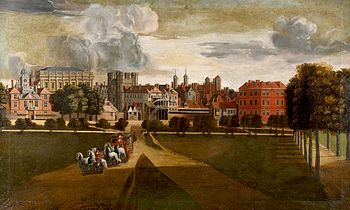‘Up and comes the flageolet master, and brings me two new great Ivory pipes which cost me 32s., and so to play, and he being done, and Balty’s wife taking her leave of me, she going back to Lee to-day, I to Westminster and there did receive 15,000l orders out of the Exchequer in part of a bigger sum upon the eleven months tax for Tangier, part of which I presently delivered to Sir H. Cholmly, who was there, and thence with Mr. Gawden to Auditor Woods and Beales to examine some precedents in his business of the Victualling on his behalf, and so home, and in my way by coach down Marke Lane, mightily pleased and smitten to see, as I thought, in passing, the pretty woman, the line-maker’s wife that lived in Fenchurch Streete, and I had great mind to have gone back to have seen, but yet would correct my nature and would not. So to dinner with my wife, and then to sing, and so to the office, where busy all the afternoon late, and to Sir W. Batten’s and to Sir R. Ford’s, we all to consider about our great prize at Hull, being troubled at our being likely to be troubled with Prince Rupert, by reason of Hogg’s consorting himself with two privateers of the Prince’s, and so we study how to ease or secure ourselves…’
The text above is from Pepys’ Diary, entry dated July 19, 1667. Samuel Pepys was not friendly with Prince Rupert of the Rhine, who served on the Tangier Committed with Pepys. Rupert was related to the Stuarts, and returned to England from German military service with the Restoration of Charles II. Sir Walter Scott thought of Rupert in terms of his battles with Montrose. The following passage comes from Scott’s “A Legend of Montrose”:
‘The celebrated Sir Henry Vane, one of the commissioners who negotiated the alliance betwixt England and Scotland, saw the influence which this bait had upon the spirits of those with whom he dealt; and although himself a violent Independent, he contrived at once to gratify and to elude the eager desires of the Presbyterians, by qualifying the obligation to reform the Church of England, as a change to be executed "according to the word of God, and the best reformed churches." Deceived by their own eagerness, themselves entertaining no doubts on the JUS DIVINUM of their own ecclesiastical establishments, and not holding it possible such doubts could be adopted by others, the Convention of Estates and the Kirk of Scotland conceived, that such expressions necessarily inferred the establishment of Presbytery; nor were they undeceived, until, when their help was no longer needful, the sectaries gave them to understand, that the phrase might be as well applied to Independency, or any other mode of worship, which those who were at the head of affairs at the time might consider as agreeable "to the word of God, and the practice of the reformed churches." Neither were the outwitted Scottish less astonished to find, that the designs of the English sectaries struck against the monarchial constitution of Britain, it having been their intention to reduce the power of the King, but by no means to abrogate the office. They fared, however, in this respect, like rash physicians, who commence by over-physicking a patient, until he is reduced to a state of weakness, from which cordials are afterwards unable to recover him.
But these events were still in the womb of futurity. As yet the Scottish Parliament held their engagement with England consistent with justice, prudence, and piety, and their military undertaking seemed to succeed to their very wish. The junction of the Scottish army with those of Fairfax and Manchester, enabled the Parliamentary forces to besiege York, and to fight the desperate action of Long-Marston Moor, in which Prince Rupert and the Marquis of Newcastle were defeated. The Scottish auxiliaries, indeed, had less of the glory of this victory than their countrymen could desire. David Leslie, with their cavalry, fought bravely, and to them, as well as to Cromwell's brigade of Independents, the honour of the day belonged; but the old Earl of Leven, the covenanting general, was driven out of the field by the impetuous charge of Prince Rupert, and was thirty miles distant, in full flight towards Scotland, when he was overtaken by the news that his party had gained a complete victory. ..’
